I am obsessed with habits. Particularly the spiritual formation potential of habits. I don’t remember exactly how it got started—I think a few book recommendations on the topic from friends. But soon, I was converted. As a historian, I make my living with my mind and spend a lot of time in my head. So, ironically, it took reading philosophical explanations of the power of habit to convince my mind that my life is shaped as much by what my body does as by what my mind thinks.

More liturgical Christian traditions have for many years (as in, millennia) practiced a “rule of life” as a tool of spiritual growth. As Justin Whitmel Earley explains in The Common Rule: Habits of Purpose for an Age of Distraction, “rule” in this context connotes “trellis” more than “regulation.” The idea is that by building certain spiritual disciplines into our days and weeks, we guide the growth of our life in healthy directions, like a plant on a trellis. The most famous rules of life are probably those developed by St. Benedict and St. Augustine for monastic communities, but the principle applies well to individual lives too. (Though from a Christian perspective, a healthy rule of life would always include regular times of Christian community and worship!)
This fall, I am for the first time teaching Baylor’s graduate historiography course, The Historian’s Craft. The course is designed as an introduction to the history profession for its future practitioners. In preparation for writing the syllabus, I polled historians on Twitter (#twitterstorians) about what they wish they had learned their first semester of graduate school. I got some great answers. My own answer was this: I wish I had been encouraged to spend more time reflecting on how to construct a healthy, sustainable pattern of life as a student, scholar, and teacher. So now that I have been handed the keys to this car, that’s one of the places we’re driving it.
On the first day of class, I will hand out some sample rules of life shared with me by an Anglican priest friend. Then over the next few weeks my students will complete the following assignment:
Instructions for “Rule of Life” Reflection Paper:
Read the “Creating a Rule of Life” handout plus ONE of the following books (your choice!):
From a Christian perspective:
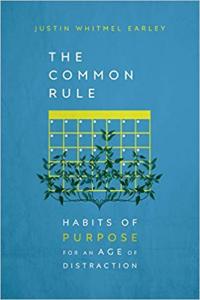 Justin Earley, The Common Rule: Habits of Purpose for an Age of Distraction
Justin Earley, The Common Rule: Habits of Purpose for an Age of Distraction
Earley develops a simple 8-part rule of life—including components like “Scripture before phone” and “curate media to four hours”—with a particular eye toward helping contemporary Americans, and especially American Christians, live well in our modern culture. His reflections on the spiritual rationale for each habit are particularly thought-provoking.
Stephen Macchia, Crafting a Rule of Life: An Invitation to the Well-Ordered Way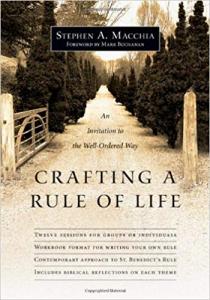
Offering the most direct instruction on creating your own rule of life, Macchia draws on the rule of St. Benedict to lead readers into constructing a wise pattern of Christian habits for the circumstances of their particular lives.
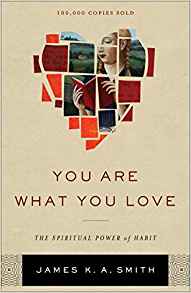 James K. A. Smith, You Are What You Love: The Spiritual Power of Habit
James K. A. Smith, You Are What You Love: The Spiritual Power of Habit
In this brief, insightful book, Smith argues that we are already engaging in habits incentivized by our culture without realizing it. These habits, in turn, are forming us into certain types of people—not necessarily ones that look like Christ. He argues for a different set of more purposefully chosen habits that point us in that direction.
Tish Harrison Warren, Liturgy of the Ordinary: Sacred Practices in Everyday Life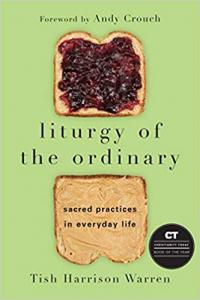
Warren walks us through common actions of each day—from brushing our teeth to sitting in traffic—and offers suggestions for how to approach them in a way that helps us encounter God through them such that they slowly shape us into holier people.
From no particular faith perspective:
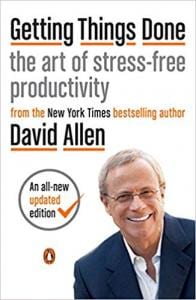 David Allen, Getting Things Done: The Art of Stress-Free Productivity
David Allen, Getting Things Done: The Art of Stress-Free Productivity
This book is a classic of its genre and offers insight into workflow, or what habits in our daily work lives lead to the greatest productivity with the least amount of unnecessary stress.
Cal Newport, Deep Work: Rules for Focused Success in a Distracted World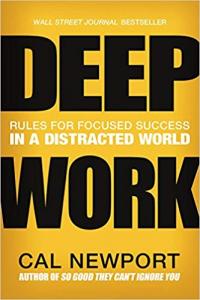
Newport argues that contemporary culture pulls us away from the type of work that is both most meaningful and most productive: focused, deep work. He offers suggestions for which practices allow us to cultivate more opportunities for this type of satisfying work.
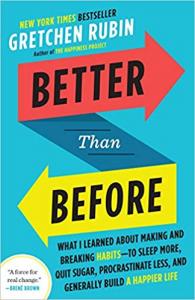 Gretchen Rubin, Better than Before: What I Learned About Making and Breaking Habits
Gretchen Rubin, Better than Before: What I Learned About Making and Breaking Habits
Rubin provides really practical advice for how to make and break habits in such a way as to guide your life in the direction you want it to go.
Laura Vanderkam, 168 Hours: You Have More Time Than You Think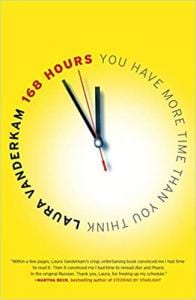
Vanderkam (my Princeton classmate, who sells a lot more books than I do :-)) analyzes how happy, successful people tend to organize their time—and how we can learn from them, given that we all have the same number of hours in a week.
As a result of what you read in the book, make at least one relevant life change for at least one week—ideally for two or more. Then write a 4-page reflection essay. About half of it should be a review of the book. The other half should be your personal reflections about: (1) your experience in attempting the change, and (2) how you would like to structure your time in graduate school going forward (does not have to be exhaustive!).
***
As I look ahead to starting the new semester next week, I too have been reflecting on what habits I want to add or tweak. The idea is that when I get in the thick of the semester, those habits will be channeling me in good directions when I wouldn’t necessarily have the mental energy to reflect on the best ways to use my time. If you join my students and me in this exercise, I’d love to hear about the results!













